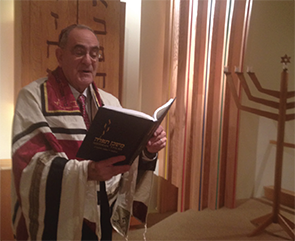In 1981, all six families decided to host a public meeting and placed a notice in the local newspaper. The question was simple: Would anyone be interested in forming a reform congregation? To their surprise, roughly 100 people attended, and 14 families signed on. Thus, Congregation Beth El was born, and a formal religious school was started a few years later.
Thirty-four years later, Congregation Beth El has grown to support nearly 140 families. It has a full-time rabbi, a synagogue of its own, a religious school for children and even a cantor—Dr. Block. During services, he leads the congregation in chanting Hebrew prayers and songs. Dr. Block says serving as a lay cantor over the decades has added another dimension to his spiritual side that even his non-Jewish patients acknowledge and appreciate.
Custom Chants
The organization that helped Dr. Block and the other families establish a reform synagogue was the Union of American Hebrew Congregation (UAHC).

Dr. Block, chanting a prayer.
“We called the Union, which gave us support and legitimized our efforts for starting this congregation,” Dr. Block says. “The organization gave us moral support, provided us with an occasional visiting rabbi and loaned us a Torah. The rabbi who came to conduct our first High Holiday services gave us a shofar,” a musical instrument of ancient origin, made of a horn, traditionally that of a ram.
Although Dr. Block has never learned how to read music and has never had a formal voice or music lesson, he can hold a tune and remembered how to chant some of the prayers he was taught in Hebrew school as a young boy. By default, he became the congregation’s cantor.
The UAHC connected Dr. Block with an ordained cantor in Boston. Every six months or so, Dr. Block would request prayers, and the cantor would sing the prayers, record them on cassette tapes and then mail them to Dr. Block. While driving between his home in Bucksport and private practice in Bangor, Dr. Block would spend the half-hour each way playing the prayers over and over again, trying to mimic the cantor. He jokingly refers to himself as a Suzuki-trained cantor; the Suzuki teaching method involves repetition and saturation in a musical environment.
Gradually, Dr. Block incorporated more and more of the prayers into the congregation’s services. Over the years, his repertoire has grown to the point where he can chant every important prayer necessary for Shabbat (i.e., Sabbath), the High Holidays, Seders, funerals and other religious events.